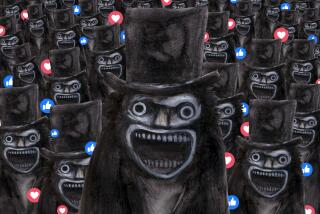MOVIE REVIEW : ‘Jack the Bear’ Confronts Boyhood Monsters : Danny DeVito stars as the host of a TV horror show, but the focus is on the pain of his motherless 12-year-old son.
- Share via
The face of 12-year-old Jack Leary (Robert J. Steinmiller Jr.)--he’s nicknamed Jack the Bear by his father, John (Danny DeVito), the host of a monster movie show on late-night television--seems slugged with sadness. He’s a resilient, industrious kid, but there’s a core of foreboding in his rapscallion features, a sense of woe.
His mother (Andrea Marcovicci), who had already separated from John, was killed a few years back in a car accident, and Jack’s memories of her, which we see in honeyed, slowed-down flashbacks, reappear to him in moments of stress. He lives with his father and his 3-year-old brother Dylan (Miko Hughes) in an Oakland neighborhood slowly going to seed--the time is 1972--and he longs for solace without quite knowing how to get it.
“Jack the Bear,” directed by Marshall Herskovitz from a script by Steve Zaillian based on the 1972 novel by Dan McCall, comes out at a time when Hollywood is aswarm with rampaging tots whose motto seems to be “Clonk or Be Clonked.” It focuses on the boy’s pain without apology. It’s almost revolutionary: a kid in the movies who actually possesses a nervous system.
Herskovitz, directing his first feature after a career in television that included co-creating “thirtysomething,” makes Jack’s game, beseeching face his film’s centerpiece, and his instincts pay off. We keep discovering more to look at, more even, perhaps, than the young actor is able to consciously reveal.
The film (citywide) is about how Jack, whose father camps it up as a monster not only to his TV audience but to the local kids, comes to recognize the real monsters of life. It’s a self-conscious fable, more languorous and conventionally “sensitive” than McCall’s antic, hippy-dippy, free-flowing book, with its reverbs from Twain and Salinger. The film of “Jack the Bear” (rated PG-13 for its theme) is closer to the movie version of “To Kill a Mockingbird,” but with a deep-toned luster in its best moments that makes it a stranger, less categorizable film than that one. (The superb cinematography is by Fred Murphy.) It even has a Boo Radley-type character: Norman Strick (Gary Sinise), the calmly crazy neighbor who twists the plot into sinister byways.
There are all sorts of sharply observed psychological details, like the sullen, unfussy moment when Jack breaks up with his girlfriend (Reese Witherspoon), or the scenes between Jack and his grandfather (Stefan Gierasch), a bitter man who was blacklisted as a screenwriter and refuses to relinquish his imperious pride.
The film, which seems truncated in places, could stand to be even more shaggy and adventurous, more poetically stylized to approximate Jack’s state of aggravated apprehension. (That would have made some of the melodrama seem less melodramatic.) Herskovitz’s principled modesty doesn’t often pull us into Jack’s way of seeing. Except for a few sequences near the end, when Jack’s terror overwhelms him, we don’t really view the world through his blinkered, fevered gaze.
A bigger problem is DeVito. The actor one thinks of for John in reading McCall’s book is somebody like the young Jon Voight, but you can see why DeVito was cast here. His squat, squalling presence is all-of-a-piece with the horror movies he introduces, and he’s just enough of a goof to reinforce the notion that John can’t take care of his kids because he’s too much the kid himself.
But DeVito’s John doesn’t really seem to be a part of this family, even a broken-off part; you don’t sense a deep link between him and Jack, and that may be because as an actor DeVito doesn’t have much of an inner life. He’s not doing Danny DeVito shtick in “Jack the Bear”--he makes a stab at subtlety--but for the most part we assume the bond between John and his son far more than we feel it.
The reason this flaw is not fatal is because the movie really belongs to Jack, and, ultimately, his feelings of loss for his mother. His father, just like his baby brother and the motley ragtag neighborhood kids and his grandparents and girlfriend and grade-school teacher and all the others, is part of a passing parade of distractions; they both taunt and mollify his aloneness. Herskovitz keeps the focus on what’s most important: Jack the Bear’s longing for succor. Even in moments of reconciliation we can feel the chill of his unprotected solitude.
‘Jack the Bear’ Danny DeVito: John Leary Robert J. Steinmiller Jr.: Jack Leary Stefan Gierasch: Grandpa Glickes Reese Witherspoon: Karen Morris
A 20th Century Fox release. Director Marshall Herskovitz. Producer Bruce Gilbert. Executive producer Ron Yerxa. Screenplay Steve Zaillian. Cinematographer Fred Murphy. Editor Steven Rosenblum. Costumes Deborah L. Scott. Music James Horner. Production design Lily Kilvert. Art director John Warnke. Set designer James Truesdale. Set decorator Cricket Rowland. Running time: 1 hour, 54 minutes.
MPAA-rated PG-13 (theme and scenes of terror).
More to Read
Only good movies
Get the Indie Focus newsletter, Mark Olsen's weekly guide to the world of cinema.
You may occasionally receive promotional content from the Los Angeles Times.









